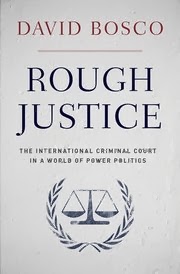 David Bosco‘s new book tells the history of the International Criminal Court. It is nicely done and will be a reference for everyone who does work in this area. The conclusion will not surprise any observers: the ICC survived efforts at marginalization by great powers but only by confining its investigations to weak countries. Thus, the ICC operates de facto according to the initial U.S. proposal, rejected by other countries, to make ICC jurisdiction conditional on Security Council (and hence U.S.) approval.
David Bosco‘s new book tells the history of the International Criminal Court. It is nicely done and will be a reference for everyone who does work in this area. The conclusion will not surprise any observers: the ICC survived efforts at marginalization by great powers but only by confining its investigations to weak countries. Thus, the ICC operates de facto according to the initial U.S. proposal, rejected by other countries, to make ICC jurisdiction conditional on Security Council (and hence U.S.) approval.
Bosco seems to think this equilibrium can persist, but the book only touches on (perhaps because it is too recently written) the growing resentment of weak countries, above all African countries, which have woken up to the fact that the Court is used only against them, and have begun to murmur about withdrawing. The Court now faces political pressure to avoid trying not only westerners, but also Africans. Meanwhile, the Kenya trials are heading toward debacle, while the ICC is unable to address international criminals like Assad. The Court’s room to maneuver is shrinking rapidly, and one wonders whether it can sustain its snail’s pace (one conviction over a decade) much longer. The book might have been called “Just Roughness.”